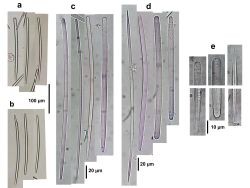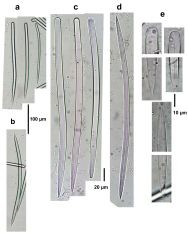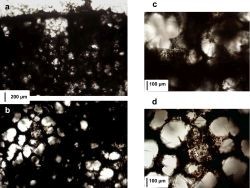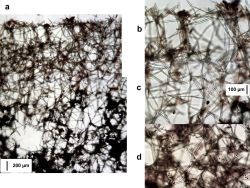gray
brown
cream
cinnamon-tan
branching
encrusting
lobate
massive
tube
crumbly
soft
Bahamas
Colombia
Panama
Svenzea zeai
Description: Thick encrustations to masses with low to high to globular, volcano-shaped oscular mounds. Specimens can reach 1 m in diameter and 20 cm in thickness. Specimens from the southern Caribbean coast of Colombia and some from Panama tend to form creeping branches, up to about 5-8 cm in diameter and reaching 1 m or more in length, even or with oscular mounds. Surface is smooth, velvety to the touch, frequently riddled with dark zoanthids; oscules tend to be large, up to 1-2 cm in diameter, and located on mounds, sometimes being part of terminal tubes, but there are also oscules flush with the surface in more even specimens. Color dark brown exterior and creamy interior, but there are also lighter brown to gray specimes. Consistency very crumbly. The architecture of the skeleton is difficult to discern owing to the remarkable amount of dark granular cells that block light under the microscope. A section through an apparently macerated part of one individual reveals an irregular isotropic unispicular to paucispicular reticulation, ending at the surface as erect 1 spicule-long spicule tracts that support an irregular, paratangential reticulation; the latter seems to have rounded meshes, 140-300 µm in diameter. Spicules curved to slightly sinuous styles to styloids, and curved oxeas to strongyloxeas, of about the same size, 130-270 µm long and 2.5-10 µm wide in the Bahamas, and 195-330 µm and 2.5-15 µm wide in the southern Caribbean. Endings can be sharp, blunt or mammiform.
Notes: This is a shallow to reef sponge living exposed. It is one of the most abundant sponges in Caribbean reefs (but scarce at Santa Marta, Colombia, an area of seasonal upwelling), which often overgrows live coral. It was originally and tentatively placed under genus Pseudaxinella, but later the genus Svenzea was erected to accommodate it (Alvarez et al., 2002) and other species with similar spiculation and with the abundant dark granular cells. Formerly considered (erroneously) by reef workers Calyx podatypa (de Laubenfels, 1934), which is a valid, different species from shallow crevices (see Zea, 1987), and is also pictured here.
Author Reference: (Alvarez, van Soest & Rützler, 1998)
Link: World Porifera Database

![<i>Svenzea zeai</i> <br />[Bahamas, Sweetings Cay]](mini/00121/00774.jpg)
![<i>Svenzea zeai</i> <br />[Bahamas, Plana Cays]](mini/00038/01183.jpg)
![<i>Svenzea zeai</i> <br />[Bahamas, Hogsty Reef]](mini/00075/01749.jpg)
![<i>Svenzea zeai</i> <br />[Colombia, Islas del Rosario]](mini/00115/01980.jpg)
![<i>Svenzea zeai</i> <br />[Colombia, Islas del Rosario]](mini/00115/01982.jpg)
![<i>Svenzea zeai</i> <br />[Colombia, Islas del Rosario]](mini/00115/01983.jpg)
![<i>Svenzea zeai</i> <br />[Colombia, Islas del Rosario]](mini/00115/01984.jpg)
![<i>Svenzea zeai</i> <br />[Colombia, Islas de San Bernardo]](mini/00115/01985.jpg)
![<i>Svenzea zeai</i> <br />[Colombia, Islas de San Bernardo]](mini/00115/01986.jpg)
![<i>Svenzea zeai</i> <br />[Colombia, Islas de San Bernardo]](mini/00115/01987.jpg)
![<i>Svenzea zeai</i> <br />[Colombia, Islas de San Bernardo]](mini/00115/01988.jpg)
![<i>Svenzea zeai</i> <br />[Colombia, Islas del Rosario]](mini/00115/01989.jpg)
![<i>Svenzea zeai</i> <br />[Colombia, Islas del Rosario]](mini/00115/01990.jpg)
![<i>Svenzea zeai</i> <br />[Colombia, San Andrés Archipelago, Courtown Cays (atoll)]](mini/00115/01991.jpg)
![<i>Svenzea zeai</i> <br />[Colombia, Islas del Rosario]](mini/00115/02003.jpg)
![<i>Svenzea zeai</i> <br />[Colombia, Islas del Rosario]](mini/00115/02004.jpg)



